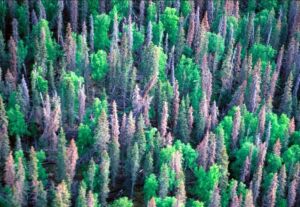In an effort to understand the influence that climate change will have on the Arctic ecosystem, researchers from McGill University in Canada are looking for help from an unlikely source: the Arctic beetle.
Already living a tight-rope existence under extreme conditions in the freezing Arctic, increased temperatures lead to more beetles, and vice-versa.
Thomas Pape, an insect researcher with the Natural History Museum of Denmark at the University of Copenhagen, contends the Canadians are on a promising path.
“The Arctic beetles will be a good barometer for judging the condition of the Arctic ecosystem during global warming,” Pape told Politiken newspaper.
“The small insects are very sensitive to cold weather and short summer seasons. So while we humans worry about climate change in the Arctic, these beetles are doing well because it’s become warmer and the ice is receding.”
READ MORE: Record number of species discovered by Danish researchers
Few beetles in Arctic
The Canadian findings (here in English) – recently published in the scientific journal Plos One – involved the registration of 460 different subspecies of Arctic beetles from the tree line in northern Ontario to Ellesmere Island much further north.
The researchers found that the beetles found in the north were carnivorous while those found in the south tended to be mostly herbivores.
Adult beetles don’t handle the cold very well and tend to perish when the winter arrives in the Arctic, while the larvae of the beetle ensure the species’ survival by hibernating through the winter.
Beetles have more subspecies, 400,000, than any other creature, but the vast majority are found in the tropics.
“It would be impossible to study the effect of climate change on beetles in the tropics because there are far too many subspecies. That’s why the Arctic is so useful because there are so few species. We just finished a study in Greenland where we identified 37 different beetle subspecies,” Pape said.
READ MORE: Making Denmark wild again: the incentive, method and risk
Yellowstone troubles
An example of the effect that climate change has on beetles can be found just south of the Canadian border in the Yellowstone National Park in the US, where warmer winter temperatures has led to a rapid increase in the mountain pine beetle.
More beetles surviving the winter has had a devastating effect on the pine trees in the region as the slightly warmer temperatures have allowed the beetles to complete their life cycles in one year instead of two.
In 2011, a report found that about 82 percent of whitebark pines in Yellowstone were unhealthy, dying, or dead because of the mountain pine beetle.
 Pines dead because of pine beetles
Pines dead because of pine beetles
(photo: US Department of Agriculture)














